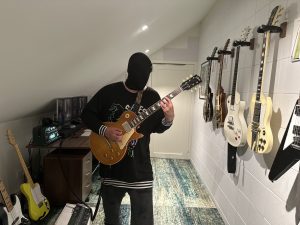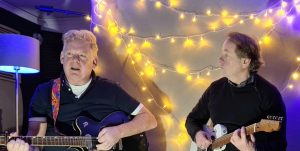Meet Harry Kappen, a talented musician and music therapist hailing from the beautiful Netherlands. With his wealth of experience and diverse musical background, Harry has not only played in numerous bands but has also made his mark as a producer for several popular Dutch pop bands.
But Harry’s passion doesn’t stop there! When he’s not rocking out on stage or creating incredible melodies in the studio, he dedicates his time to educating and uplifting others. As a lecturer in an international master’s degree program in music therapy based in Rotterdam, Harry has the privilege of helping young children and adolescents navigate through various challenges. Additionally, he lends his expertise to families struggling with dysfunctional patterns, providing them with the support they need.
What sets Harry Kappen apart from other musicians is his ability to craft thoughtful and profound lyrics that truly resonate with listeners. Every song he releases is a heart-wrenching masterpiece, and his latest track is no exception. Last year, Harry mesmerized us with “Wargames,” a powerful anti-war anthem inspired by the conflict in Ukraine. In early 2023, he gifted us with “The Freedom Inside,” an enchanting melody that encourages individuals to reflect upon the significant global changes occurring all around us.
Harry answered some questions for us, sharing his thoughts on the music industry moving forward.
What inspired you to write your new single “Not All Of Us Agreed”?
We live in a time where technology is developing rapidly. People like you and me are challenged every day to adapt as best as possible and to follow and keep up with these developments. Sometimes I get the feeling as if science leads a life of its own, outside our democratic processes, for example. I think it is wise if we stop now and then and ask ourselves whether we want all these changes at all. Did we ever agree to it? It seems as if we first invent something and only then ask ourselves if it was useful to do so. Agreements and regulations are then devised and determined afterwards. The chance that it will be abused is, of course, very high.
How do you think your music and lyrics can help bring awareness to new technologies?
I don’t have the illusion that my songs have much influence on those changes. I am someone who considers, I write about what surprises or amazes me. No more. Everyone can do what they want with it.
What message are you trying to convey with this song?
We should especially be aware of a situation in which the people and their government become too distant from each other. We want to keep a grip on what is happening. Fact and fiction are sometimes already intertwined. And I hope that a technology like A.I. will not fall into the wrong hands and will bring us more harm than good. No doubt there are many benefits, think of medical science, that’s wonderful. But history teaches us time and time again that there are always people who have less good intentions.
What does music therapy mean to you and how did you get into it?
I’ve been playing music all my life, music belongs to me. I can express my feelings and emotions in it, it calms me down, it excites me and it is a social environment in which I meet other people. So it makes a lot of sense to me that music therapy is a good tool to work with in a therapy. It was pointed out to me at the time by a band member who is also a music therapist. So I started training. I now mainly work with adolescents and their families.
I use the properties of music: melody, harmony, structure, dynamics and the direct link to feeling and emotions. And the music therapeutic sessions are therefore a great practice place for my clients to get started with these elements. Indirectly, through the music, my clients are confronting their own problems. Music holds up a mirror to them. And changes that take place in the music during the sessions influence the personal circumstances of the participants. Always a very nice process to experience.
What do you think are the biggest challenges young kids and adolescents are facing today?
It is of all times that adolescents ask themselves during this phase of life ‘who am I’, ‘what can I do’, ‘what’s my identity’ etc. In the present time, this is extra difficult for many because they are inundated with information via social media, their telephone, the internet . Not only do they find this difficult, but certainly also their parents and educators. The biggest challenge, in my opinion, is getting into real contact with yourself. Am I living my life the way I really want to, or am I living my life according to all the information (and disinformation!) I take in every day?
What’s real, what’s fake, what are my limits, does everything I want have to happen right now or do I go step by step? When can I be satisfied with my life?
What was the hardest part about producing music for other Dutch pop bands?
What often causes a lot of difficulties is to have everyone’s agendas run in sync. Organizational ‘hassle’. Musically I see much less problems. My role is not to change or criticize musicians. Everyone has their own ideas and I try to be of service to them as much as possible, together with the musicians. Before recording, proper coordination is therefore necessary and everyone’s roles must be clear, so that everyone can also know what is expected of the other. And I am happy to make my experience that I have gained available. As long as the fun in making music together remains central, there are no major problems.
How has working with different bands and artists shaped your own music?
Of course everything influences me, other musicians also inspire me. I can enjoy a good guitar player or singer with a lot of talent. Just as former music heroes like Bowie and McCartney have inspired me. They all contribute to who I am musically. But as I get older, that influence becomes less and less. I know who I am as a person and as a musician and those are my instruments now.
What do you think of the current state of the music industry?
I find that complicated. I can’t handle that. And that’s why I tend not to care too much about it. Making my own music is central to me. I follow people like Rick Beato on Youtube with great interest and great respect. I’m a big fan of Knower, a great band with Genevieve Artadi and Louis Cole, the fun is splashing and they arrange everything outside the usual ‘music industry’. Record yourself, release records yourself and sell them yourself. As long as there are people like Rick Beato en musicians like Knower there is hope.
What advice would you give to aspiring musicians out there?
Be yourself, have fun making music, develop yourself and try to translate musically what you come up with in your head as best you can. And keep a good balance between ‘stubbornness’ and ‘being open to advice from others’. Don’t limit yourself too quickly in the idea of wanting to be a musician yourself. There are plenty of opportunities around that; want to be a good producer, a teacher, a financial advisor, an organizer, an instrument maker etc etc.
What can we expect from you in the future?
I’m busy finishing my new album. I have to do it in my spare time because of my therapeutic work and my work as a teacher on a master’s degree in music therapy, so I don’t have much free time. But I still have many ideas that I want and need to develop.
One thing is certain; the new album will be the best album yet!
I also hope to be able continuing working with many other musicians, both as a musician and as a producer. You can follow me on my website: www.harrykappen.com and you can contact me via the MTSmanagementgroup.






